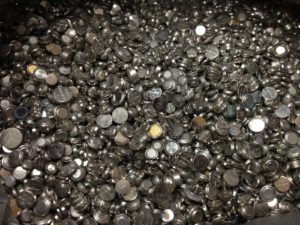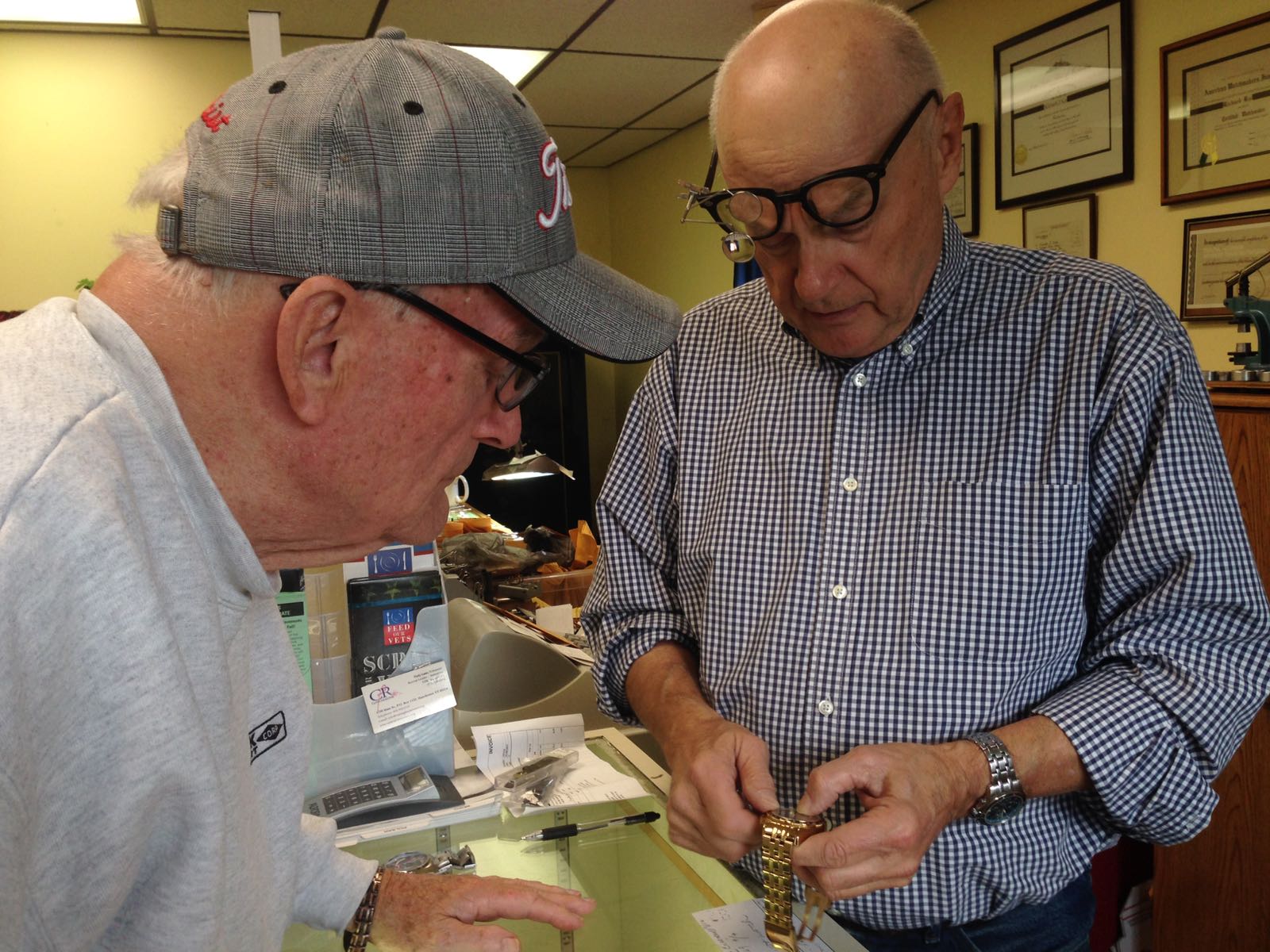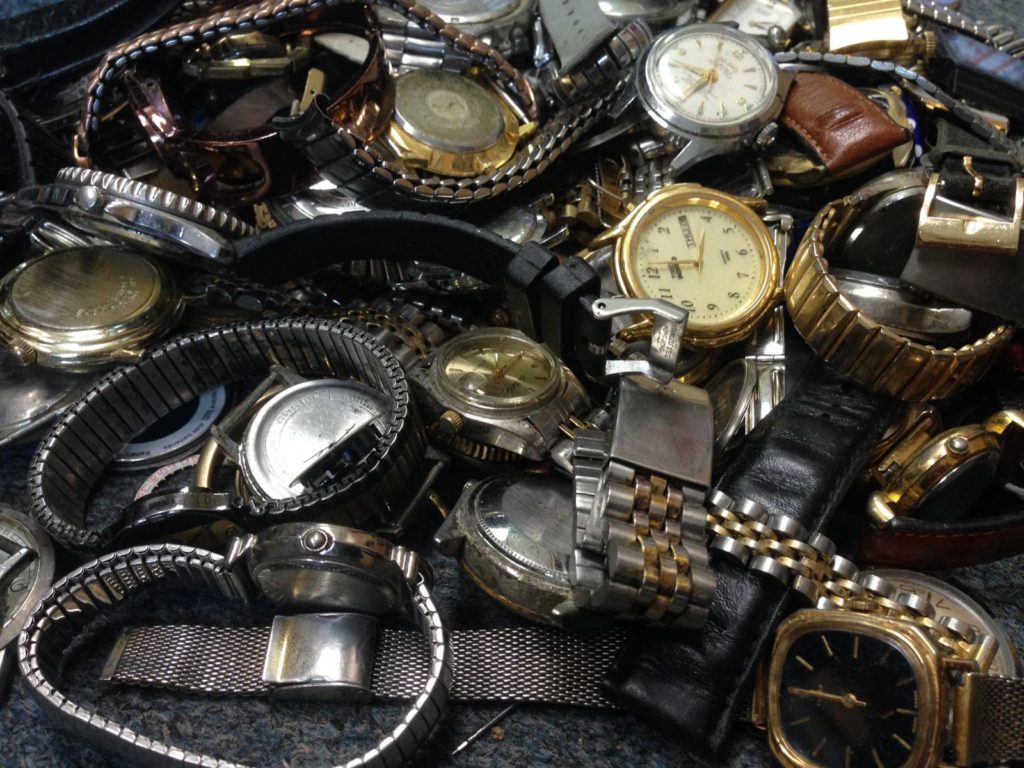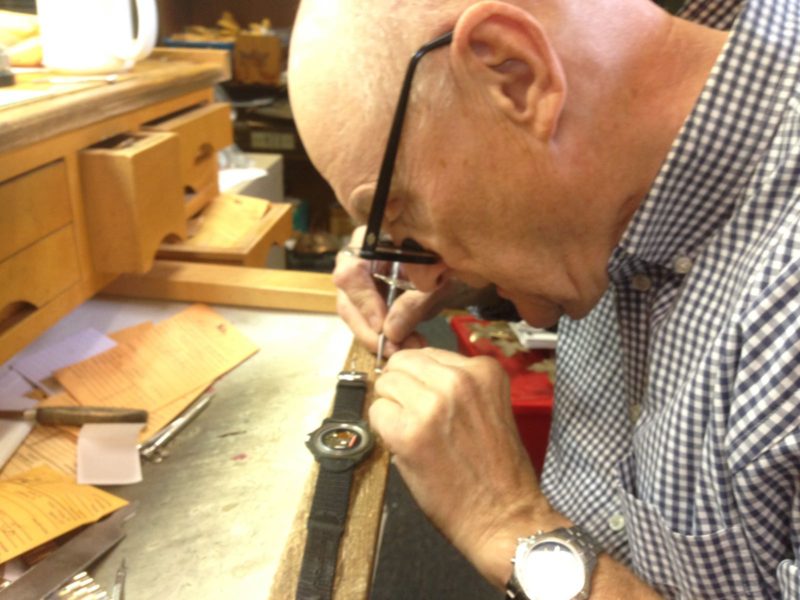Meet Richard Kiel. He is Oneida County’s watch doctor. He’s the diagnostician, the surgeon, the pharmacist and nurse to all your watch needs. And you don’t need Medicaid to afford him.
For the last 40 years, Kiel has been working furiously to keep up with the pace of watches that come through his door at 45 Burrstone Road. No computer, no smart phone, just hard work and personality.
In a space encompassing about 10 by 25 feet, part of his attached garage, you will find him bent over a table at The Village Time Shop. From wristwatches to stopwatches, fobs, clocks and chronometers, he repairs them all. And he does so with a smile, a grunt and perhaps a story.
The now 72-year-old has a story about pretty much everything. He has stories about the area, about mechanics, about nanotech, about history, economics, beekeeping, fly-fishing, women, cars, kindness and everything in between. He can’t help himself. It’s part of his make-up.
“I was real shy until after college. But then I started work and you have to deal with people all day,” says Kiel. “Sometimes I can see they’re lonely. I figure gas ‘em up, chat ‘em up. Don’t cost me nothing.”
Those are pearls of wisdom from Kiel.
Here’s another one: “When you’re right, you’re right twice a day.”
In his standard uniform of jeans and a checkered shirt, he barely stops moving in his little shop. He’s up to greet every customer, speaks with them for a few minutes, peers at the watch in question using his eyeglasses with the two magnifying lenses, back to his workbench, up again looking for the right tool, and so on. There are packets of finished and unfinished product strewn everywhere, and he reaches for the right one each time a customer gives him a number. It’s really quite a feat to watch.
We may call it a mess, but he calls it controlled chaos. He has 67 different types of batteries and knows where each one is located. He knows where his buckles, bezels, center wheels, mainspring barrels, and winding mechanisms live, as he reaches for something without even looking up.

“Balance is important,” says Kiel to one customer. “For a watch to work properly the balance must go 270 degrees in each direction. If you shock your watch, the balance goes out the window, and sometimes that’s the problem.”
Kiel explains after the 1960s most companies started making shock-proof watches, and according to him, quartz watches will withstand most jars, jolts, and jerks.
But lint and dirt can also be big culprits in the business.
“Oh yeah, those things will get into the gear train and you’ll be in a goat rope,” says Kiel.
In this mysterious and expensive game, customers can also be consistently overcharged. Often people who need their watches fixed have no idea what’s wrong or what’s needed to fix the problem. The quality, movement and brand of the watch will determine cost and time. And watch manufacturers insist the customer send in their watches for service, which can take weeks and cost hundreds of dollars. Kiel says manufacturers count on it.
“I take cash or check, no credit. People in bigger cities can charge double or triple or more, but I’m in Utica, and I don’t have a bunch of overhead malarkey so that keeps the prices down,” says Kiel. “Never had a check bounce, never, not in all this time. I’m proud of that.”

Dentist Susan Sekreta of Utica has been a regular customer for 12 years. “Dick’s the only guy I trust.”
That’s fairly clear from the stream of customers come in. It takes him a few minutes to pinpoint what the problem is. Sometimes, just seconds. Kiel says he’s never had to advertise. His shop has existed through word of mouth and a walk-in clientele.
Pilot Mike Kem from New Hartford has been visiting Kiel for years. “He does it right. You can count on him, and there’s never been an issue. You don’t see guys like this anymore.”
Kiel was raised at a time when working a job early was expected. At 11 he was already caddying at Twin Ponds Golf Course. At 16, he worked for Carvel, and by the time he started college for business administration at SUNY Morrisville, he was stacking cases for Royal Crown Bottling.
He was born in New York Mills in 1944, an only child to a mother who worked at G.E. and a machinist father who worked at Bendix Aviation.
“I guess that’s where I might have gotten my interest in watches. I remember the very first time I broke down a Timex to all its little parts and then put it back together. There’s a sense of amazement that comes over you when you get it running. You see it, and then your brain makes a connection. I was hooked,” says Kiel.

When he began his career 40 years ago there were more than 43, 000 watch repair technicians nationally, and 12 of them were based in Oneida County. The Wall Street Journal reports there are less than 3,500 today and only one in this area. Kiel is the last of a dying breed.
Statistics on the trade report people don’t really wear watches for function anymore. That’s because most everyone has a cell phone. Kiel says watches worn these days are a sign of prestige, as in the case of a Rolex, a Cartier, or a Patek Phillippe. Or the wearer has a sentimental attachment to it. Watches, more and more, are becoming a sign of the past, much like Kiel.
But Kiel has been busy these decades. He credits the formal training he received at the Bulova facility in Queens.
“There were two guys who gave me a career. My instructor, Werner Ruppert from Germany, who was detailed to a fault. And my other instructor Frank Shank, who was a great communicator,” says Kiel. “If you get into this business today, you will always have a job. But if you’re not formally trained, it’s a non-starter.”
Kiel says the training prepared him for any situation. “That’s your base. And your experience is your learning curve. That’s it, that’s all.”
Russell Liotta, a retired Brooklyn firefighter who now lives in Whitesboro, is a big fan. Several years ago he arrived at the shop with his son, family heirloom in hand. He says that pocket watch had been handed down from father to son for five generations. He couldn’t find anyone to fix it. But Kiel took one look, hooted, and made his day.
“Do you remember that, Dick?” asks Liotta.
“Yup. Had some fun with that one. When you hear from the family about some of the history behind these watches, you’re privy to some very interesting stories,” says Kiel.
“Nobody would touch my Nixon,” says Brian Hibbard of Clinton. “And if they did, they would charge me hundreds of dollars. I came to Dick, and he took care of me. I work in California and own several very expensive watches, but I come here to get them fixed.”
Kiel’s retirement is a big concern for his customers. Where would they go? After all, he is their doctor.
“I’m healthy, got no problems. I piss and moan about working, but it’s just bluster. If I’m not working, I don’t know what to do with myself,” says Kiel. “No retirement. Unless I conk out.”
“My reputation is important. This is my house and my business. You treat people that come to your house with respect. I could do a half-baked job, but I do the whole she-bab-bab.”
More pearls from Kiel.


Thank you for publishing about this dying art. We are all affected by changes in technology and perhaps few businesses more so than watch repair. Most of us still have a watch regardless of whether it is worn. The human side to this story is compelling.
Thank you for your comment Alison, and yes, Dick made this story compelling!